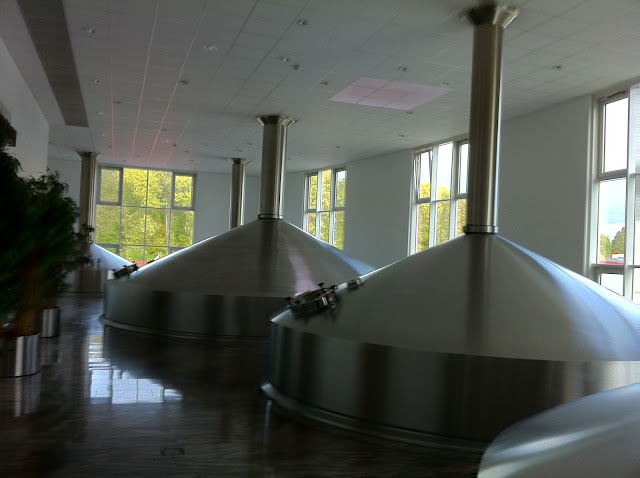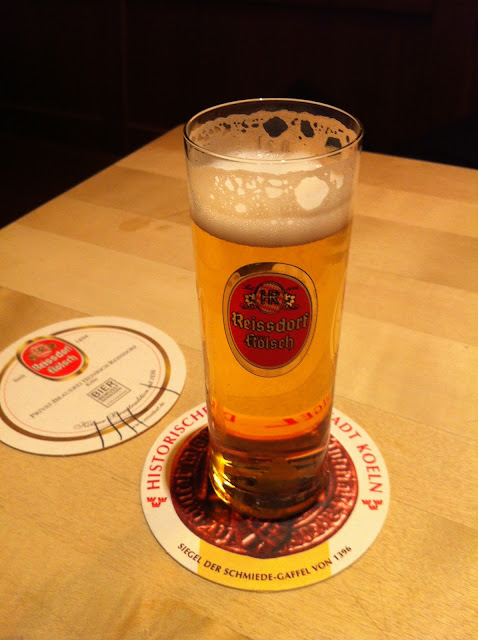One Beer to Rule Them All
COLOGNE. Superficially, the idea that in Düsseldorf they drink alt and kolsch in Cologne seems like a reasonable one. (And never the twain shall meet. Turns out there's a HUGE--albeit good-natured--rivalry between the cities. In Düsseldorf, you don't mention kolsch; at Reissdorf Brauerei in Cologne they wouldn't mention Düsseldorf. Each city has its fiefdom, and the breweries guard the boarderlands like vigilant soldiers.) But if you think about it longer than three minutes, the concept is insane. We live in a market economy; new is exalted, variety demanded. Yet walk into one of the atmospheric pubs here, and you have a binary choice: yes or no. The drink is kolsch and your communication to the waiter only involves a welcoming or abjuring cock of the head.
This is remarkable. I visited Reissdorf today, and was staggered to consider that not only does the brewery sell nearly its entire production to people living within 50 kilometers of the brewery, but it has to--outside Cologne, people don't drink it. The beers actually vary noticeably brewery to brewery, but there's no local rivalries, no tub thumping for the "true" or "original" kolsch. You walk in, pay your euros 1.80, get your elegant little stange glass of kolsch, and the waiter keeps a tick-mark tally on your beer mat. Breweries make one beer, and customers drink one beer--but only here. How is it that no brewery has tried to sell imperial kolsch or Westphalian Dark Ale or ... anything? (Leave aside the politics of kolsch and the konvention for just a moment.) Anywhere else, and that would be a given.
Instead, there is a virtuous symbiosis. The little glasses come, the gently malty, crisp, and delicately spicy/floral hopping--absolutely ideal with bratwurst--continues to enliven the palate. The glasses hold only .2 liters (less than 7 ounces), and the beer less than 5% alcohol, so you never think one more is too dangerous. The trouble is ever leaving the pub.
This is remarkable. I visited Reissdorf today, and was staggered to consider that not only does the brewery sell nearly its entire production to people living within 50 kilometers of the brewery, but it has to--outside Cologne, people don't drink it. The beers actually vary noticeably brewery to brewery, but there's no local rivalries, no tub thumping for the "true" or "original" kolsch. You walk in, pay your euros 1.80, get your elegant little stange glass of kolsch, and the waiter keeps a tick-mark tally on your beer mat. Breweries make one beer, and customers drink one beer--but only here. How is it that no brewery has tried to sell imperial kolsch or Westphalian Dark Ale or ... anything? (Leave aside the politics of kolsch and the konvention for just a moment.) Anywhere else, and that would be a given.
Instead, there is a virtuous symbiosis. The little glasses come, the gently malty, crisp, and delicately spicy/floral hopping--absolutely ideal with bratwurst--continues to enliven the palate. The glasses hold only .2 liters (less than 7 ounces), and the beer less than 5% alcohol, so you never think one more is too dangerous. The trouble is ever leaving the pub.
 |
| Reissdorf outgrew its urban brewery and expanded. |
 |
| A fresh beer and a new tick mark. |